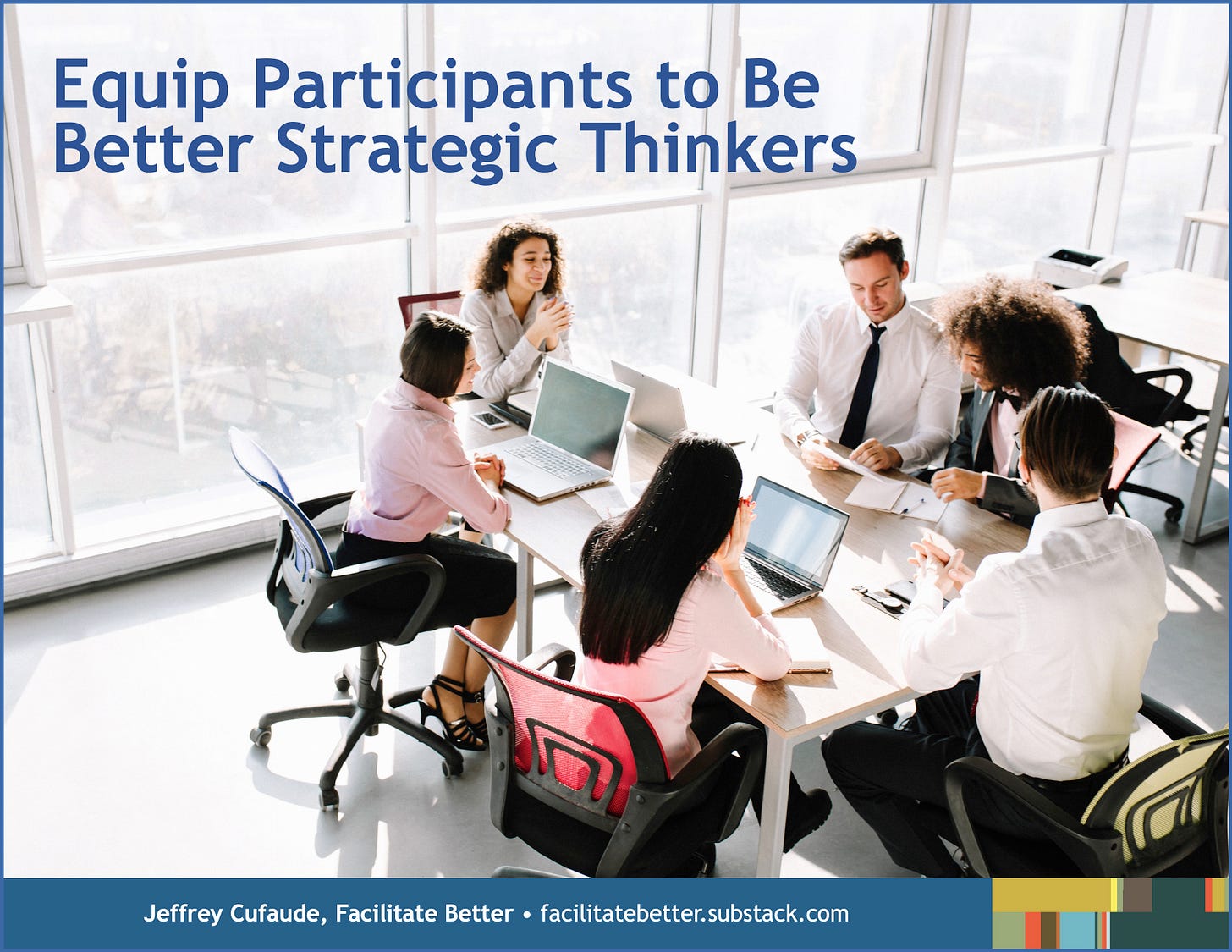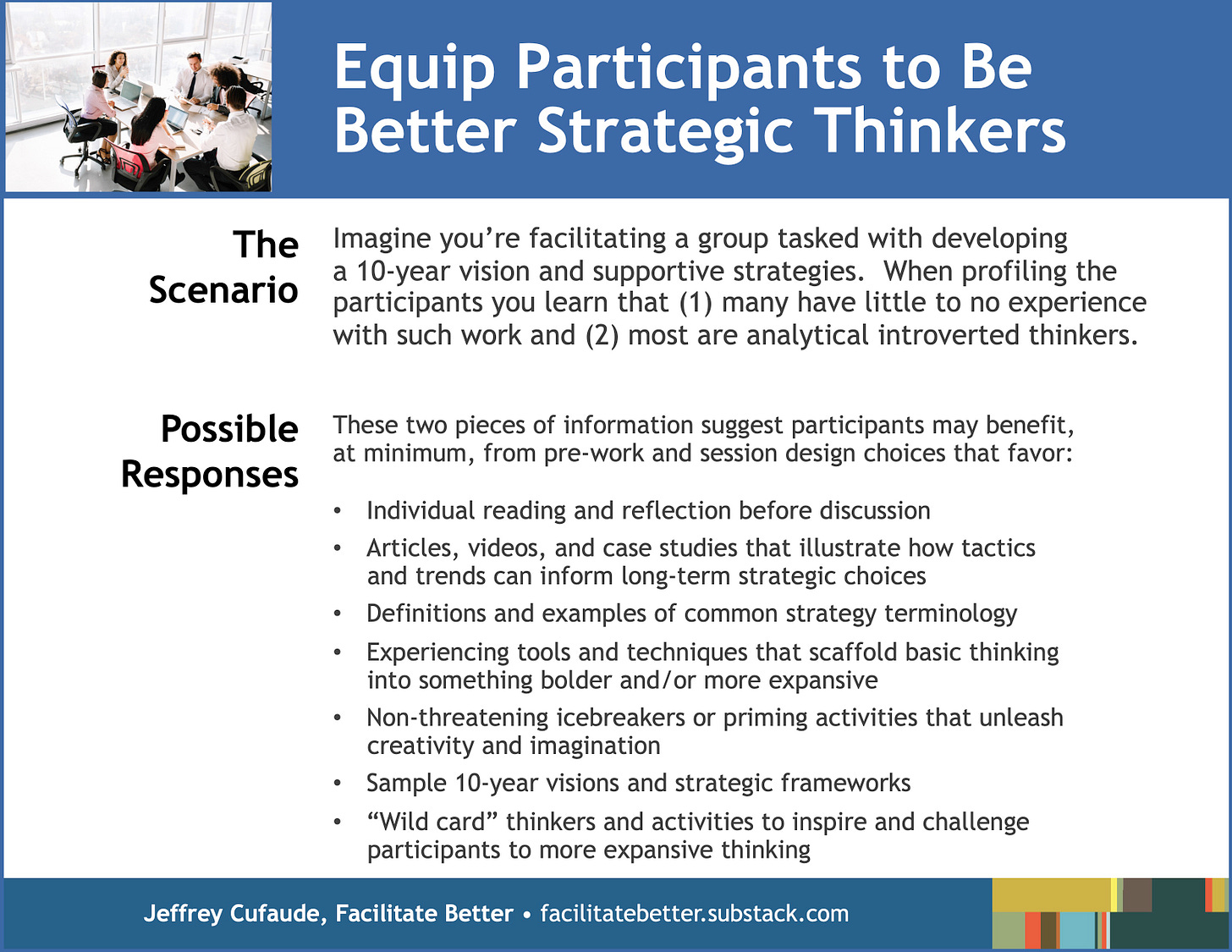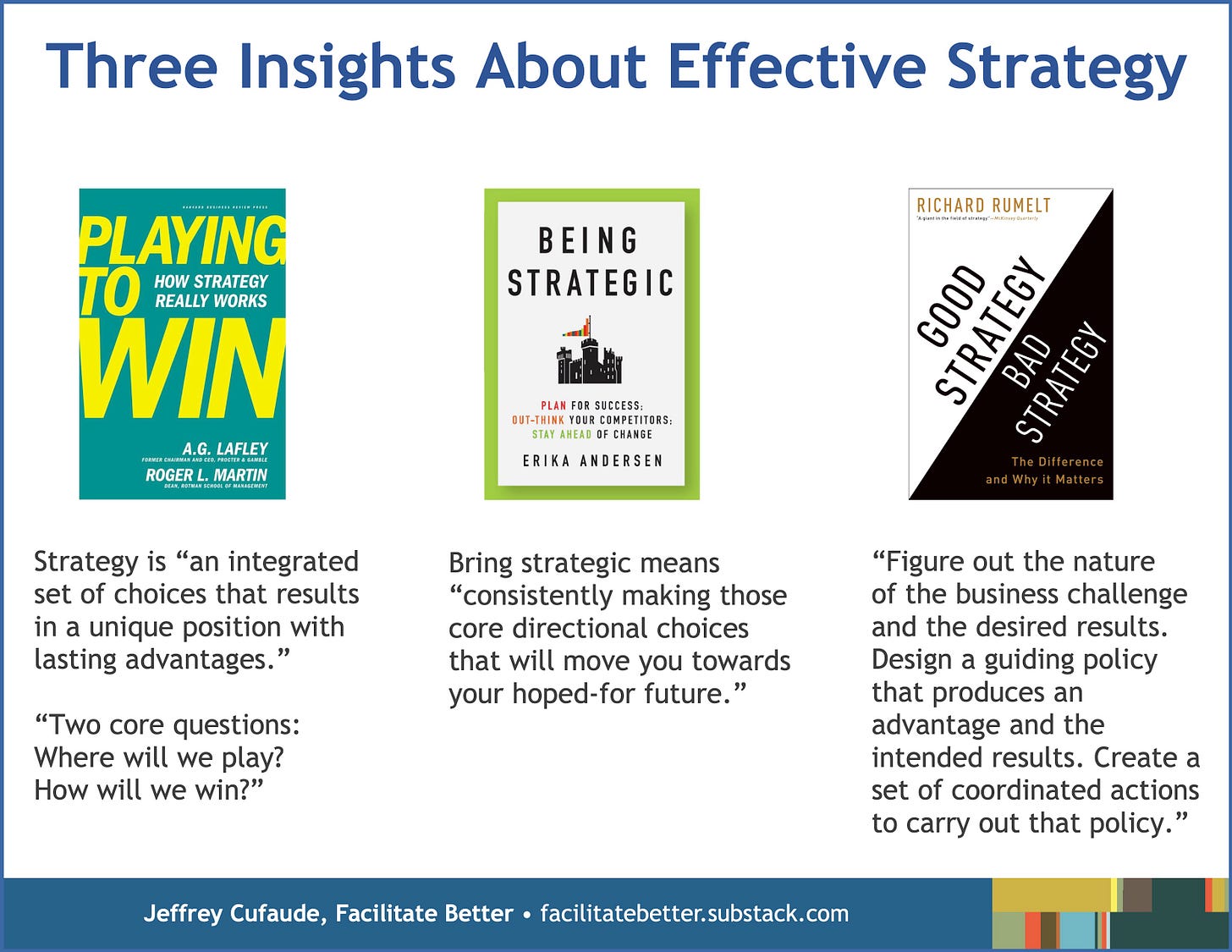Equip Participants to Be Better Strategic Thinkers (Facilitation Friday #80)
Don't assume people will just show up ready and able to do the work.
A personal trainer wouldn’t design a workout for a client without first assessing her existing strength, conditioning, and mobility.
A doctor wouldn’t prescribe medications without examining a patient and perhaps running several tests.
Yet some facilitators design the prework and agendas for strategic planning sessions with insufficient knowledge of the strategic thinking capabilities of the participants.
Don’t commit this major facilitation error.
The design and facilitation of strategic thinking and planning discussions must ALWAYS be a highly customized effort. Here is a two-step process to do so.
#1: Profile Participants
Ideally, those invited to participate in a strategy development session possess the necessary mindset, skills, and knowledge for the work. But participants often are selected because of their roles or titles, not demonstrated strategic thinking experiences and capabilities. In some cases, an existing entity (i.e., the board of directors, a specific committee, or the management team) automatically is tasked with strategy development and a facilitator can’t change that.
Regardless of those involved, it always is useful to surface relevant information about participants and make it transparent to all involved. Having answers to the following 10 questions helps me determine agendas for the session(s); tools, techniques, and formats for the discussions and decision-making; and appropriate pre-work. Shared with participants, this same information provides them useful context for my session design and facilitation choices, as well as insights into each other.
Consistent with the strengths-based work of Gallup, what strengths might each participant contribute to the strategy work? What weaknesses might they need to manage around?
In terms of strengths and weaknesses, what is the aggregate profile of the strategic planning session participants?
What experience(s) and relationships might inform individuals’ contributions to the work?
What potential biases, assumptions, or individual agendas might participants possess?
How are they likely to engage in the actual strategy conversations? Creative or analytical? Big picture or details? Extroverted or introverted? Et al.
What would make it easier for individual participants (or the group collectively) to engage in the envisioned strategic thinking and decision-making?
What experiences with, beliefs about, and understanding of strategy and strategy development do participants possess?
What perspectives or voices beyond those of the actual participants might we want to draw on to inform the discussions and decisions?
What will make it easier to produce the desired results given the planning process timeline and how participants will engage with each other (i.e., a series of virtual meetings over many months, a weekend in-person planning retreat, a one-day offsite followed by monthly in-person office meetings, et al)
What do participants expect of—and think they will need from—me as the facilitator?
To gather this information, survey or interview participants in advance and then share a summary of it prior to the session(s) for everyone to review. You also can quickly collect select info at the onset of the session (be it onsite or online) using polling or a human graph exercise (physical if online, using the screen annotation tool if virtual).
Sometimes as an icebreaker or priming activity, I have people fill out a personal profile like the one below.
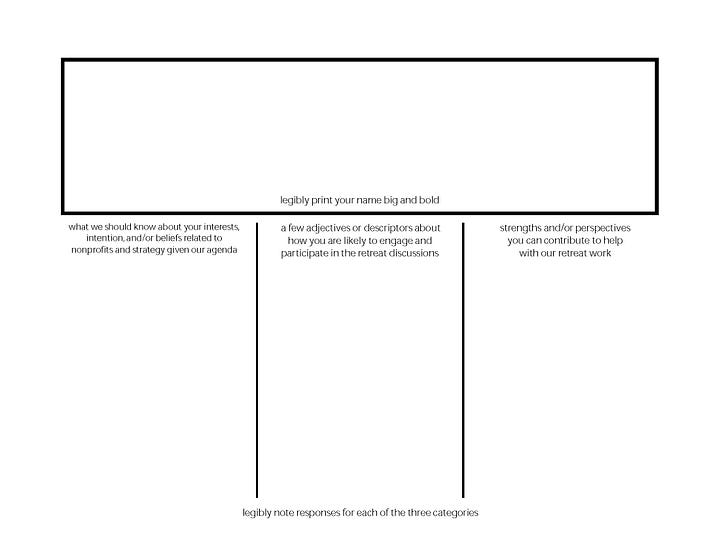
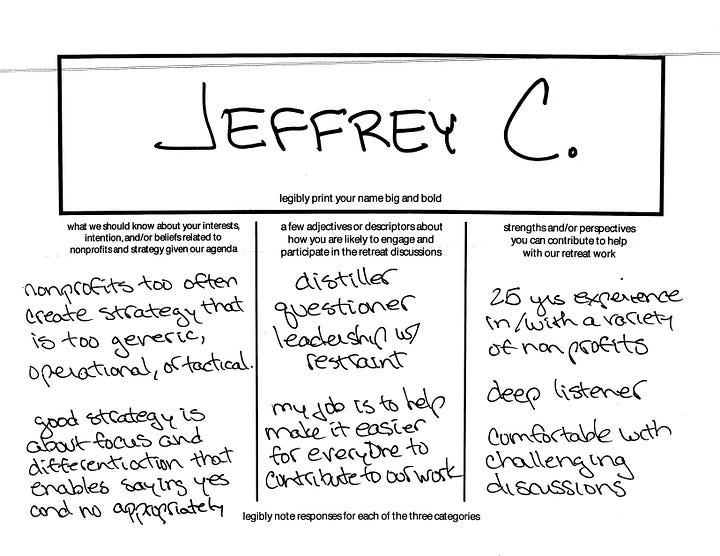
Participants bring their completed profile to the first session and post it upon arrival for others to peruse.
Regardless of when or how participant info is surfaced and shared, I facilitate a discussion of it, usually beginning with one simple question: What stands out most for you and what might it mean for our efforts? This helps build participants ownership of the process and improve my design and facilitation choices.
#2 Prepare Participants
The aggregate group profile helps determine what prework will best prepare participants to “hit the ground running.” Done well, prework accelerates quality discussions and decisions once participants convene.
Most strategy development processes draw from a common menu of customizable prework, including:
Survey responses from relevant stakeholders
Thought-provoking articles on key strategic issues
Case studies of how others handled analogous situations
Contemplating and/or responding to strategic thinking prompts
Field research (physical or virtual) that exposes participants to others doing interesting work in relevant areas or who have embraced new thinking or technologies
Interviews with select thought leaders who can expand session participants’ ideas of what might be desirable and/or doable
Relevant historical trends and milestones for the organization
Data regarding external trends and forces
Internal data related to the strategic issues and questions in play
Ideally, your preparation approach and timeline allows participants to complete the prework selected, submit their reactions and takeaways prior to the actual session, and for their submissions to be compiled and distributed as additional prework.
Enhancing Prework
Completing more asynchronous work in advance maximizes the time during synchronous sessions, as well as better supports individuals who prefer extra time to digest and contemplate background material.
So while having participants read material on their own is useful (and can feel like a significant accomplishment), whenever possible I also have them react to this prework prior to our convening. These reactions can further inform the design and facilitation of the strategy development session or process.
To gather more useful reactions, provide some basic structure that makes it easier for participants to discern, capture, and share their thoughts. I usually offer a few categories for participant takeaways and a couple of unfinished stems/prompts to complete.
I always close with this vital question:
Based on the responses you’ve noted, what questions, issues, or discussion items should the agenda(s) include?
You can compile and distribute these distilled takeaways as possible additional advanced reading along with the final agenda or share it for a quick skim at the session’s onset. I almost always make a brief discussion of these aggregated responses an early agenda item. In rare cases, I’ve been able to convene participants on a call prior to the session for this discussion and to further refine the agenda based on their input.
Remember, the agenda is one of the most underutilized tool for more effective meetings and this includes strategy development sessions. More information on building better agendas can be found.
Bonus
Need to “level set” basic understanding of what good strategy contains? Sharing these three insights might do the trick.
Bottom Line?
Productive strategic thinking and planning sessions or processes benefit from significant asynchronous advance work and exchanges between the facilitator(s) and participants. When all parties make the contributions required, the resulting prework and agenda(s) are highly customized, collaboratively developed, and more likely to accelerate quality discussions and decisions.
Getting in Action
Think about the most effective strategic thinking or planning conversations you’ve participants in or facilitated. What are a few elements that made them so effective?
Review the 10 questions for profiling participants. What additional information would you find valuable to inform your design and facilitation of a strategic planning session or process? What questions might you ask to gather it?
Imagine participants will only commit to one hour of prework/reading. What items would you prioritize, either ones from the menu offered and/or ones from your thinking and experiences?
© Facilitate Better and Jeffrey Cufaude. All rights reserved.
To affordably license this content for reprint on your site or in electronic or print communications or to contact me regarding customized facilitation skills workshops or consultations, complete this form.




